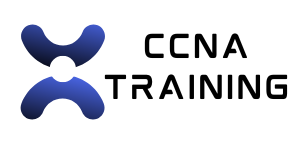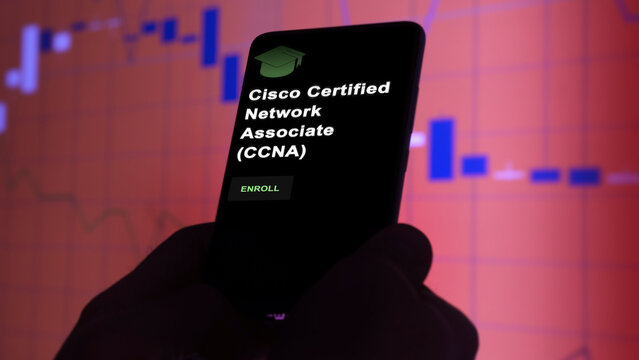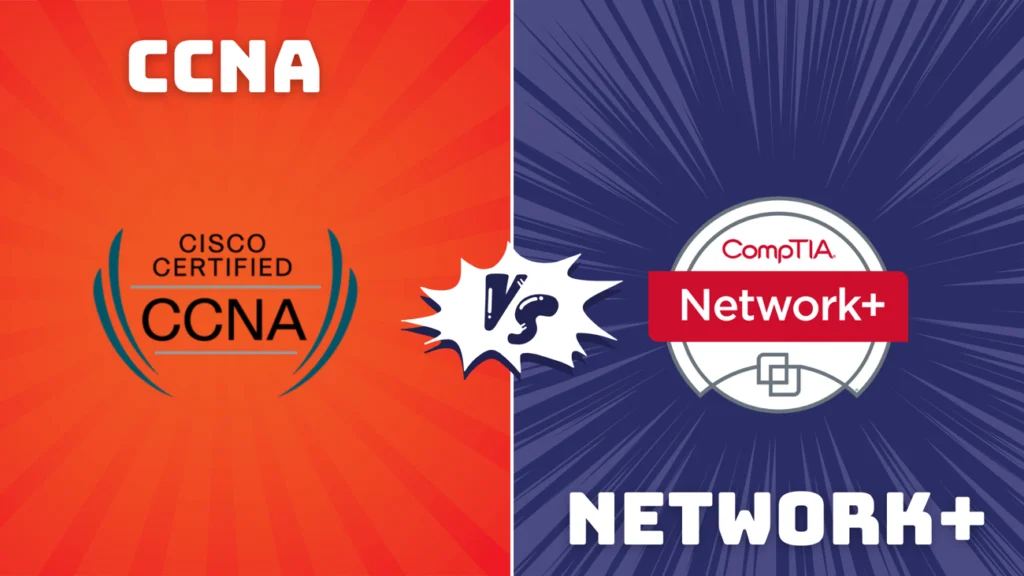Two certifications that are frequently mentioned when beginning your IT career or trying to advance your networking career are CompTIA Network+ and Cisco Certified Network Associate (CCNA). Though they are not the same, both are respected, provide access, and aid in understanding networks. So, which one ought you to choose?
This article will assist you in determining that. What each certification is, how difficult it is, who should take it, what jobs it leads to, and more will be covered in short sections. You’ll be able to tell which one best suits you by the end.
CCNA: What is it?
Cisco, one of the leading manufacturers of networking equipment, offers the Cisco Certified Network Associate (CCNA) certification. It’s likely that Cisco manufactures the switches and routers you see in offices and data centers.
Your ability to install, configure, and troubleshoot networks—especially with Cisco equipment—is demonstrated by your CCNA certification. It is highly regarded in the field and frequently necessary for positions as network administrators.
The current version is just known as CCNA. It covers a wide range of topics, including wireless, automation, IP addressing, routing and switching, and basic security.
Describe Network+.
CompTIA, a renowned IT trade association, offers the Network+ certification. It teaches you networking concepts without emphasizing any particular brand, such as Cisco, because it is vendor-neutral.
Network+ is intended for novices. The fundamentals of networking are covered, including how networks function, what devices are used, basic configurations, wireless, cabling, protocols, and troubleshooting.
If you’re new to IT and want to learn about networks before going further, this is a great place to start.
Who Should Take Each Skill Level?
For novices, Network+ is the best option. Although nine to twelve months of IT experience is advised by CompTIA, prior experience is not required. It’s a good starting certification that gets you ready for entry-level positions.
CCNA is more sophisticated. It works best for those who have some prior practical networking experience or training. People who want to specialize in network infrastructure and advance into more technical roles frequently take it.
Are They Covered?
While networking basics are covered in both certifications, CCNA goes much further. Subnetting, routing protocols, network automation, detailed IP addressing, and configuring Cisco equipment with actual commands are all covered in the CCNA. Without concentrating on particular vendors, Network+ provides you with a broad overview of networks, covering the fundamental ideas.
Practical knowledge of Cisco IOS commands, fundamental security implementation, and some wireless concepts are all part of the CCNA curriculum. Network+ doesn’t require manual configuration and is more theory-based.
Network+ is an excellent resource for learning the conceptual underpinnings of networks. The CCNA is a better choice if you want to learn how to actually construct and manage networks, particularly those that are based on Cisco.
Level of Difficulty
Network+ is thought to be simpler. It covers fundamental ideas and primarily consists of multiple-choice questions. Although the test is easier for novices to take, you will still need to study.
CCNA is more difficult. It has a variety of questions, including simulations, multiple-choice, and configuration challenges. Command memorization, a thorough understanding of protocols, and practical problem-solving skills are required.
If networking is new to you, CCNA will be difficult. For this reason, some people begin with Network+ in order to strengthen their foundation and confidence.
Jobs Available
Network+ helps you get hired as a junior network technician, help desk technician, or IT support specialist. It’s excellent for people who are new to or changing careers in IT.
A CCNA makes you eligible for more technical jobs such as infrastructure technician, systems administrator, network administrator, or network engineer. For positions involving the configuration and management of actual networks, employers frequently demand or favor CCNAs.
Network+ can help you get your first tech job. The CCNA credential is more effective if you want to work in networking.
Vendor Specific versus Vendor Neutral
Network+ is independent of vendors. Without concentrating on a single brand, it teaches you how networks function generally. For those who work in environments with mixed hardware, this makes it an excellent place to start.
CCNA is unique to Cisco. It emphasizes Cisco’s tools, software, and hardware. Much of what you learn is related to Cisco’s technology, even though many concepts are applicable to other platforms.
CCNA skills are extremely valuable because Cisco is used globally. However, Network+ might feel more relevant if you work in a setting with equipment from a different brand.
Study Time and Educational Resources
If you work at Network+ part-time, you can typically finish studying it in one to two months. Official study guides, YouTube videos, and online practice exams are just a few of the numerous resources that are available. Labs are optional but not necessary.
Depending on your background, CCNA usually requires three to six months of study. You will have to spend time in practical labs using actual Cisco hardware or simulators like Cisco Packet Tracer. It takes longer to learn the more complex material.
Compared to Network+, CCNA requires a lot more hands-on work, which becomes evident during preparation.
How They Are Seen by Employers
Network+ is a positive indicator to employers that you know the fundamentals of networking. Support and entry-level IT positions benefit from it.
The CCNA is thought of as a more advanced, technical certification. It demonstrates your commitment to networking and your ability to handle intricate systems. Recruiters are frequently impressed by CCNA, which is specifically requested in many job postings.
Continuing Education and Renewal
The validity of both certifications is three years. You must pass a more difficult CompTIA exam or accrue continuing education units (CEUs) in order to renew Network+. You have two options for CCNA: retake the test or obtain Cisco continuing education credits via certifications and training.
An overview of the main distinctions
CCNA involves practical work and focuses on Cisco networks. It leads to more specialized jobs and is more difficult and technical. For someone who wishes to work in infrastructure or networking, it’s perfect.
Network+ is more general, vendor-neutral, and simpler. It’s excellent for newcomers or IT support professionals who wish to establish a foundation in networking.













